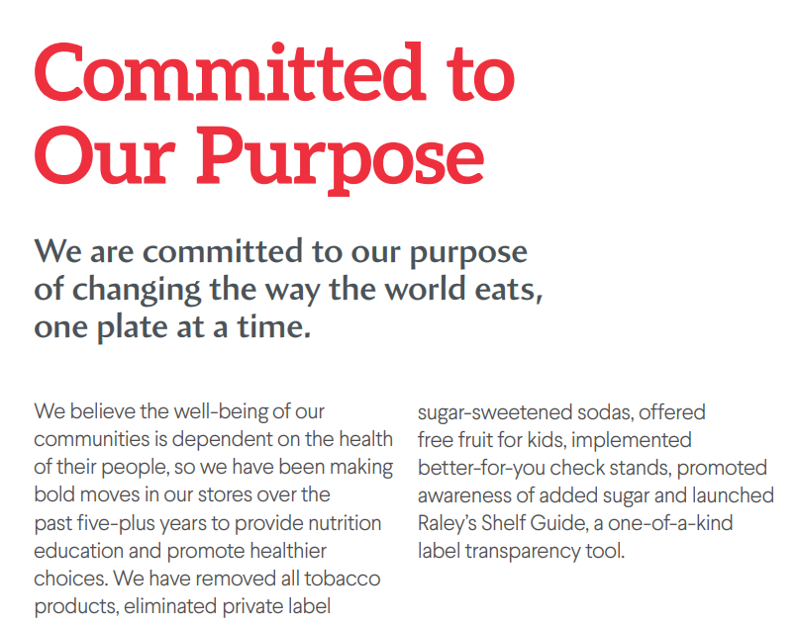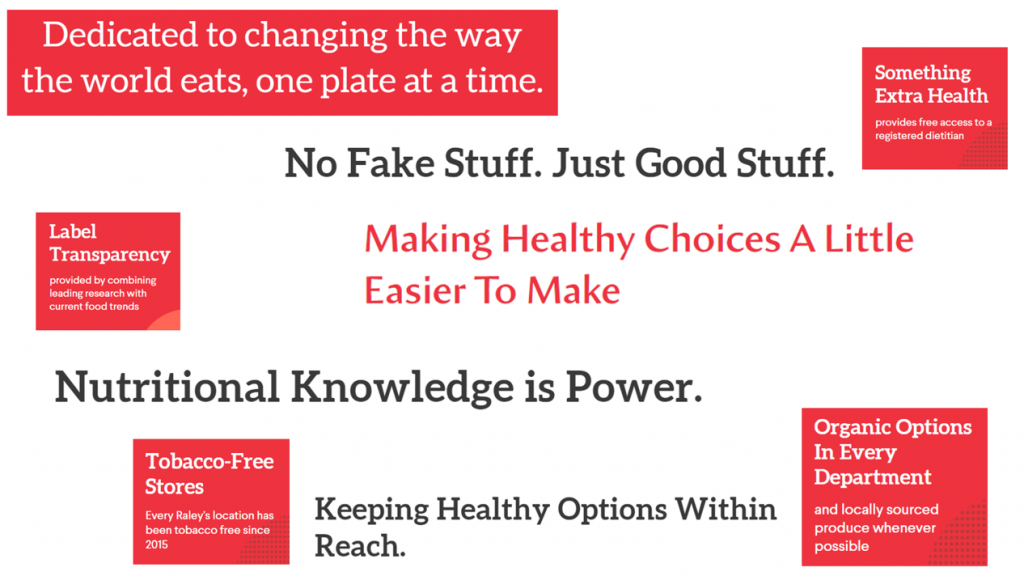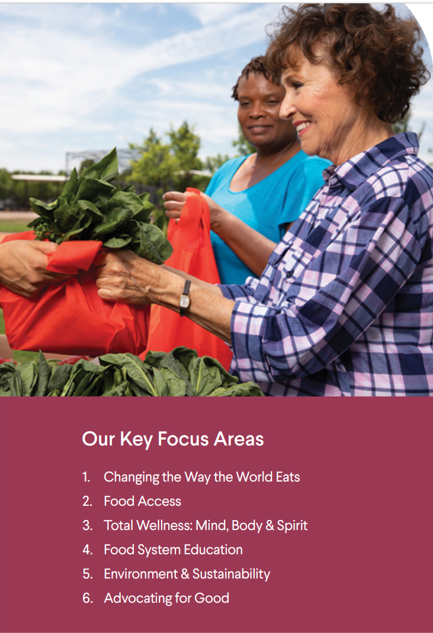This week, Raley’s, a grocery chain based in California, released its first-ever Raley’s 2020 Impact Report
 “Imagine a grocery store with a higher purpose,” the landing page for the company’s social impact resources calls us to do.
“Imagine a grocery store with a higher purpose,” the landing page for the company’s social impact resources calls us to do.
In today’s post, I explore — or chew on, if you will — Raley’s Report through the lens of health, wellness, and social factors key to citizens living full and resilient lives. The Raley manifesto is especially timely with the medical, emotional, and social impacts of COVID-19 not yet in our collective rear-view mirror.
The first Raley’s Market opened in Placerville, CA in 1935, and today as a family-owned business operates 126 stores — mostly in California and a few in Nevada.
In the Report, Raley’s makes five promises to their team:
- To empower growth opportunities
- To communicate openly and honestly
- To celebrate “you” with meaningful recognition
- To lead with purpose and passion
- To promote healthy life balance.
Joining with other companies, publicly and privately held, in the current moment is Raley’s committing to “Respect & Inclusion,” detailed on page 11 of the Report. The company is working with a third-party firm to help develop programs for training, policies and procedures. As of the publication date, 43% of Raley’s team was defined as “diverse:” the definition including people who identify with at least one of the EEOC’s ethnic, racial, and/or cultural groups.
Of note, too: 40% of Director Level or Above Team Members are Female, 50% of the Executive Committee is Female, and 17% of the Executive Committee is openly LGBTQ.
 The second graphic pulls out some of the health and wellness messages from the Report. “Making healthy choices a little easier to make” and ‘Keeping Healthy Options Within Reach” are tactics that can nudge us toward nutrition and, as their dedication says, “changing the way the world [and we] eats, one plate at a time.”
The second graphic pulls out some of the health and wellness messages from the Report. “Making healthy choices a little easier to make” and ‘Keeping Healthy Options Within Reach” are tactics that can nudge us toward nutrition and, as their dedication says, “changing the way the world [and we] eats, one plate at a time.”
Note, too, that Raley’s is a tobacco-free zone, making the choice that CVS/pharmacy made back in 2014 to drop tobacco from its stores and re-brand as CVS/health. In 2015, Raley’s eliminated tobacco products from its stores.
Furthermore, the store engages nutritionists, offers organic products in every category, and has implemented better transparency on labels.
This speaks to the mantra here that, “Nutritional Knowledge is Power.”
 This next chart lists six key focus areas for Raley’s in working to meet their commitment to changing the way the world eats, a plate at a time.
This next chart lists six key focus areas for Raley’s in working to meet their commitment to changing the way the world eats, a plate at a time.
These targets are…
- Food access
- Total wellness for mind, body, and spirit
- Food system education
- Environment and sustainability, and
- Advocating for good.
Raley’s geography sustained two major crises in 2020: to be sure, COVID-19, as well as the fires that devastated so many communities as well as environmental/air quality for so many citizens in California. The company’s team collaborated with community organizations to provide various forms of emergency relief responding to the fires that profoundly impacted thousands of families.
Raley’s folks also collaborated with teams on the ground throughout communities to bring fresh food to people sheltering in place (including seniors in isolation), as well as addressing the digital divide for students in low-income areas to learn from home during shelter-in-place quarantine.
In Sacramento, the company’s town headquarters, Raley’s also distributed information to about one-half million shoppers and staff through in-store posters and leaflets in bags on the surging issue of child abuse and domestic violence during the pandemic.
“Together we have the power to transform our food system, our communities, and our planet for the better,” Mike Teel, Owner, Chairman, and Chief Visionary Officer of Raley’s envisions at the conclusion of the Report.
 Health Populi’s Hot Points: The public health crisis accelerated the private sector’s migration to ESG — environmental, social, and governance goals. This is happening globally, especially evident in Europe in some of my own work health/care ecosystem touchpoints like Philips, Danone, Unilever, Novartis, among others.
Health Populi’s Hot Points: The public health crisis accelerated the private sector’s migration to ESG — environmental, social, and governance goals. This is happening globally, especially evident in Europe in some of my own work health/care ecosystem touchpoints like Philips, Danone, Unilever, Novartis, among others.
Now Raley’s takes its place with these companies, explicitly calling out its health/wellness/community focused mission — nourishing to three key stakeholder groups: people, communities, and the planet.
Walking this talk and covering all three of these bases is Raley’s commitment to sourcing private label products made in the communities in which the stores operate — that is, in/from California and Nevada. Raley’s Living Local program enables store produce managers to partner with family-owned farms to source local produce from within 50 miles of each store.
In my own personal and family commitment to endeavor to eat a Zero Kilometer food and lifestyle that we can more easily do when in Italy and parts of Europe, I applaud Raley’s approach which “nourishes” not only the body, but the community and financial/economic souls as well.
